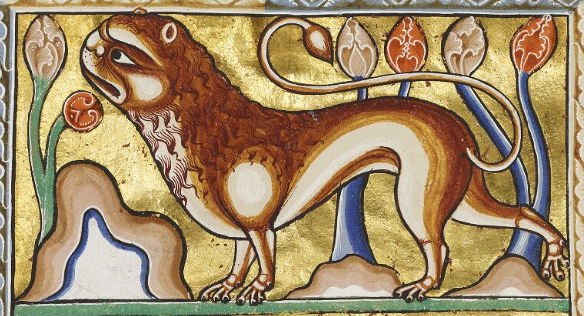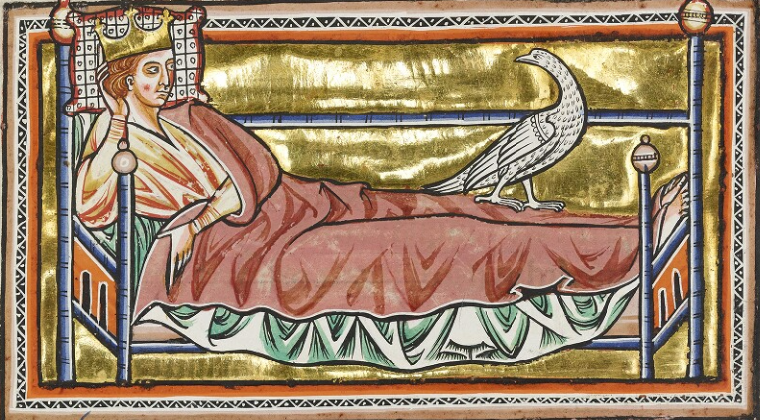Here we are at the end of the academic year! It seems like just yesterday that I was sending the first email of Michaelmas. Thank you to everyone who has organised seminars and reading groups, given papers, hosted events and conferences, and contributed to our rich community at Oxford. It’s been the busiest OMS year on record, and it’s been so wonderful to see our medievalist community thriving. In the words of Alcuin:
Nihil laudabilis est in homine, quam sapientiae decus et caritatis affectus
[Nothing is more praiseworthy in a person than the glory of wisdom and the goodwill of love, Ep. 290]
According to this, Oxford’s medievalists are very praiseworthy indeed! We would like to celebrate our community in an annual record publication, recounting the highlights of the year. All events included in the newsletters will be included as a matter of course, but if you have published a book, held a special event, or given a special paper, or would just like to send a paragraph about your seminar/reading group, we would love to hear from you! See our blog post for more information. All submissions must be received by August 20th.
We have a bumper list of events this week. For a list of all events taking place after the end of this week, please see the end of the events section:
ANNOUNCEMENTS:
- Celebrating OMS 2022/23: Call for Submissions: The OMS Record will be completed in time for the new academic year, both online and in (limited) print format. We welcome all submissions detailing events or book releases from the academic year 2022/23. Please send submissions to luisa.ostacchini@ell.ox.ac.uk. All submissions must be received by August 20th 2023.
- CAT – Conversations Across Time: What do horses, medievalists, black hole orbits, boardrooms, and quantum computers have in common? Inspired by the Medieval Mystery Plays, artist in residence at the Physics Department Pam Davis has developed an art-piece ‘Conversations Across Time’ which links medieval theatre, women in science, and Quantum future. Free tickets for the performances in the unique Beecroft Building (Physics) on June 15th, 17:30-18:30, June 16th, 17:30-18:30, June 17th, 14:30-15:30, and June 17th, 17:30-18:30 available via the website https://www.citizensai.com/.
EVENTS THIS WEEK:
Monday 12th June:
- The Byzantine Graduate Seminar will meet at 12:30-14:00 via Zoom. This week’s speaker will be Jack Dooley (Royal Holloway, University of London), Between the self and the other: the case of the gasmouloi in Late Byzantium, and the respondent will be Dr Yannis Stouraitis. To register, please contact james.cogbill@worc.ox.ac.uk.
- The Medieval Latin Manuscript Reading Group led by Matthew Holford and Andrew Dunning is meeting as usual via Teams from 1-2pm. This term we will read some satirical poetry from a thirteenth-century manuscript, the so-called ‘Bekyngton anthology’ (Bodl. MS. Add. A. 44). Sign up for the mailing list to receive updates and the Teams invite, or contact matthew.holford@bodleian.ox.ac.uk or andrew.dunning@bodleian.ox.ac.uk for more information.
- The Queer and Trans Medievalisms Reading and Research Group meets at 3pm at Univ College, 12 Merton St Room 2. This week’s theme is The medieval hyena: Emma Campbell, ‘Visualizing the Trans-Animal Body’. All extremely welcome! To join the mailing list and get texts in advance, or if you have any questions, email rowan.wilson@univ.ox.ac.uk.
- The Medieval History Seminar meets at 5pm at the Wharton Room, All Souls College. This week’s speaker will be Emilia Jamroziak (Leeds), ‘Understanding the cult of saints in the late medieval Cistercian order‘. The seminar will also be available remotely via Teams. The Teams session can be accessed by logging in to Teams with your .ox.ac.uk account and joining the group “Medieval History Research Seminar” (team code rmppucs). If you have any difficulties please email: medhistsem@history.ox.ac.uk.
- The Oxford Interfaith Forum meets online via Zoom at 6pm. Professor Katherine Southwood, Senior Fellow of the Oxford Interfaith Forum, Associate Professor in Old Testament, Faculty of Theology and Religion, University of Oxford, and Tutorial Fellow in Theology and Religion at St John’s College, Oxford, will be leading a session on ‘Metaphor, Illness, and Identity: Psalms 88 and 102‘ as part of the Psalms in Interfaith Contexts Reading Group.To register, please click here.
Tuesday 13th June:
- The Medieval Church and Culture Seminar meets at the Wellbeloved Room, Harris Manchester College, with tea & coffee from 5pm; papers begin at 5.15pm. This week’s speaker will be Peter Kidd (freelance researcher), ‘Tracing the Provenance of a Medieval Manuscript: from start to finish‘. Everyone is welcome at this informal and friendly graduate seminar! As an appetizer, have a look at the latest blog post RECEPTIO Redux.
Wednesday 14th June:
- The Medieval German Seminar will meet at 11:15-12.45pm at St Edmund Hall Old Library. In Trinity Term, we are continuing to discuss Heinrich von Neustadt’s texts, focussing on ‘Von Gottes Zukunft’. We meet in person in the Old Library of St Edmund Hall, this week with the topic: Apocalypse! Further information and reading recommendations via the teams channel; if you want to be added to that: please email Henrike Lähnemann.
- The Old High German Reading Group at 11-12 in 41 Wellington Square, 2nd floor (Henrike Lähnemann’s office). This week’s text will be Wessobrunner Gebet. It will be an opportunity to read and analyse some simpler OHG texts and give people the chance to read the oldest form of German if they’ve not been exposed to it before. It will be very informal, and all are welcome. Led by William Thurlwell william.thurlwell@wolfson.ox.ac.uk – contact him for updates.
- The Medieval Latin Document Reading Group meets on Teams at 4-5pm. We are currently focusing on medieval documents from New College’s archive as part of the cataloguing work being carried out there, so there will be a variety of hands, dates and types. A document is sent out in advance but homework is not expected. Contact Michael Stansfield for further details and the Teams link.
- The Late Antique and Byzantine Seminar meets at 5pm at Ioannou Centre for Classical and Byzantine Studies, 66 St. Giles. This week’s seminar will be a Special OCBR lecture by James Howard-Johnston (emeritus, Corpus Christi), ‘The Last Great War of Antiquity: Course and Consequences’. You can also join the seminar remotely via Teams, click here.
Thursday 15th June:
- The Medieval Women’s Writing Reading Group meets at 3-4pm at Lincoln College: meet at the lodge. This week’s theme will be Hierarchies: ecclesiastical, non-ecclesiastical and “alternative” hierarchies of power used and created by medieval women. Please email katherine.smith@lincoln.ox.ac.uk to be added to the mailing list and get texts in advance, or to find out more.
- The Piers Plowman in Context discussion group will be led by Kantik Ghosh in the Main Quad Boardroom at Univ from 4:30-5:30pm. For this last session we will be discussing Passus XX of the B-text, in relation to some texts by Bonaventura, Aquinas, and Pecock, available online through this link. All welcome! Email Jacob Ridley (jacob.ridley@univ.ox.ac.uk) with any questions.
- The Invisible East Group is co-hosting a webinar with the Elahé Omidyar Mir-Djalali Institute of Iranian Studies online at 5pm. The speaker will be Prof Geoffrey Khan, University of Cambridge, ‘The Arabic documents from early Islamic Khurasan‘. Registration and more information at this link.
- The Medieval Visual Culture Seminar meets at 5.15-6.45pm at St Catherine’s College, Arumugam Building. This week’s speaker will be Sara Lipton, Stony Brook University: ‘Blood Piety and Anti-Judaism in an Early Fourteenth-century Illuminated Prayer Book from Liège‘. For further information, contact Elena Lichmanova (elena.lichmanova@merton.ox.ac.uk).
- WOOPIE (Oxford Old English Work in Progress Seminar) meets at 5.15-6.30pm in the Ferrar Room, Hertford College. This week’s speaker will be Mar Gutiérrez Ortiz (University of Seville), ‘Isidore’s Etymologies, A Source for Boniface’s Classification of Metrical Feet in the Caesurae uersuum‘.
- The Oxford Interfaith Forum meets online via Zoom at 6pm. Professor Matthew Milliner, Senior Fellow of the Oxford Interfaith Forum, and Professor of Art History at Wheaton College, USA, will be leading a session on ‘The Tao of Mary: Images of the Virgin in the Church of the East‘ as part of the ART in Interfaith Contexts Reading Group. To register, please click here.
Friday 16th June:
- The Medieval Coffee Morning meets as usual 10:30am in the Visiting Scholars Centre of the Weston Library (instructions how to find it) with presentation of items from the special collections, coffee and the chance to see the view from the 5th floor terrace.
- Exhibition Launch: Early Modern Monsters At 5pm, History of the Book students from MML and the MSc Digital Scholarship are jointly launching the digital editions and a Monster Exhibition in the Taylor Institution Library, Main Hall (with the exhibition open in the Voltaire Room from now until 26 June). The focus will be on early modern monstruous birth pamphlet but there will also be medieval monsters and their modern successors to marvel at.
SUMMER EVENTS:
Monday 19th June:
- Distance: Medieval and Modern Languages Conference will take place at 9am-6pm in the Taylor Institution Library. For the full programme, see our blog here.
- The Byzantine Graduate Seminar will meet at 12:30-14:00 via Zoom. This week’s speaker will be Rachel Catherine Patt (Princeton University), From Pliny’s Potter to Proclus’ Vision: Tracing the Role of Pothos in Byzantine Visual Culture, and the respondent will be Dr Maria Lidova. To register, please contact james.cogbill@worc.ox.ac.uk.
- The Oxford Interfaith Forum meets online via Zoom at 6pm. Ilana Tahan OBE, Lead Curator of Hebrew and Christian Orient Collections, The British Library, will be leading a session on ‘British Library Hebrew Treasures Reveal Interfaith Narratives: The Sana’a Pentateuch‘ as part of the International Interfaith Reading Group on Manuscripts in Interfaith Contexts. To register, please click here.
Wednesday 21st June/ Thursday 22nd June:
- The Joint Oxford-Princeton Conference: State Documents from the Medieval Islamicate World takes place from 21st June 8.45am to 22nd June 5pm at Trinity College, Oxford. For full details, click here. To attend the colloquium, please register using the form at this link. Participation is free of charge, but advanced registration is requested.
Thursday 13th July:
- WOOPIE (Oxford Old English Work in Progress Seminar) meets at 5.15-6.30pm in the Lange Room, St Cross College. This week’s speaker will be Rachel Burns (Oxford), ‘“I will open my mouth in parables”: A new biblical context for early medieval English riddles’.
For those of you moving on to new things outside Oxford, I’d like to wish you luck in your endeavours on behalf of all of us at OMS. If you would like to stay in contact via the mailing list, please let me know so that I can update your details. For everyone else, I look forward to returning to your inboxes in October – I am remaining in post as communications officer for 2023/24:
Sequenti vero anno certius aliquid de nobis audies vel videbis
[You will see me next year, or hear more definite news of me, Ep. 17]
It has been an honour and a pleasure to be your guide to the year’s medieval happenings. At a time when humanities are in decline, it’s been such a joy to see our community flourishing and thriving. On behalf of everyone at OMS, I’d like to extend a huge thanks to everyone for making this such a wonderful year. Wishing you a restful and productive summer, and I will see you again in October!

Ashmole Bestiary, Bodleian Library MS. Ashmole 1511, f. 86 v.
Viewable in full at Digital Bodleian
















